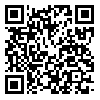Volume 15, Issue 11 (February 2018)
Nursing and Midwifery Journal 2018, 15(11): 835-842 |
Back to browse issues page
Download citation:
BibTeX | RIS | EndNote | Medlars | ProCite | Reference Manager | RefWorks
Send citation to:



BibTeX | RIS | EndNote | Medlars | ProCite | Reference Manager | RefWorks
Send citation to:
Kazemi S, Didarlo A, Khalkhali H, Feizi A. STUDYING THE RELATIONSHIP BETWEEN SELF-EFFICACY AND DIETARY ADHERENCE, IN PATIENTS UNDER HEMODIALYSIS. Nursing and Midwifery Journal 2018; 15 (11) :835-842
URL: http://unmf.umsu.ac.ir/article-1-3123-en.html
URL: http://unmf.umsu.ac.ir/article-1-3123-en.html
1- Urmia University of Medical Sciences
2- Associate Professor, Faculty of Nursing and Midwifery, Urmia University of Medical Sciences, Urmia,Iran (Corresponding Author)
2- Associate Professor, Faculty of Nursing and Midwifery, Urmia University of Medical Sciences, Urmia,Iran (Corresponding Author)
Abstract: (4742 Views)
Background & Aims: Following a special diet, restricting liquids, and taking medicine to cure patients suffering from chronic kidney failure who are being treated by hemodialysis are crucial. The present study was carried out to study the relationship between self-efficacy and following a special diet among these patients.
Materials & Methods: A case-control study was carried out on 310 patients receiving hemodialysis at Taleghani Educational and Healthcare Center in Orumiyeh. In this research, the patients were sampled through full enumeration and were divided to two groups_ a group with members who followed their diet, and the other group in which the members did not follow the diet_ according to their average results from laboratory parameters. The self-efficacy of the patients was measured and compared by a valid and reliable tool made by the researcher.
Results: The results obtained from comparing the demographic data (age, gender, and ...) indicated that there was not a significant statistical difference between the two groups. The results from comparing the average values for self-efficacy in the following group (64.41±30.6) and non-following group (08.36±83.6) indicated a meaningful difference between these two groups (p˂0.05).
Conclusion: The members of the following group had a higher self-efficacy compared to the members of the non-following group. Therefore, taking some actions in order to boost the self-efficacy in the patients of the latter group may accompany an increase in their accepting a special diet which can lead to better therapeutic results.
| Rights and permissions | |
 |
This work is licensed under a Creative Commons Attribution-NonCommercial 4.0 International License. |





 gmail.com, unmf
gmail.com, unmf